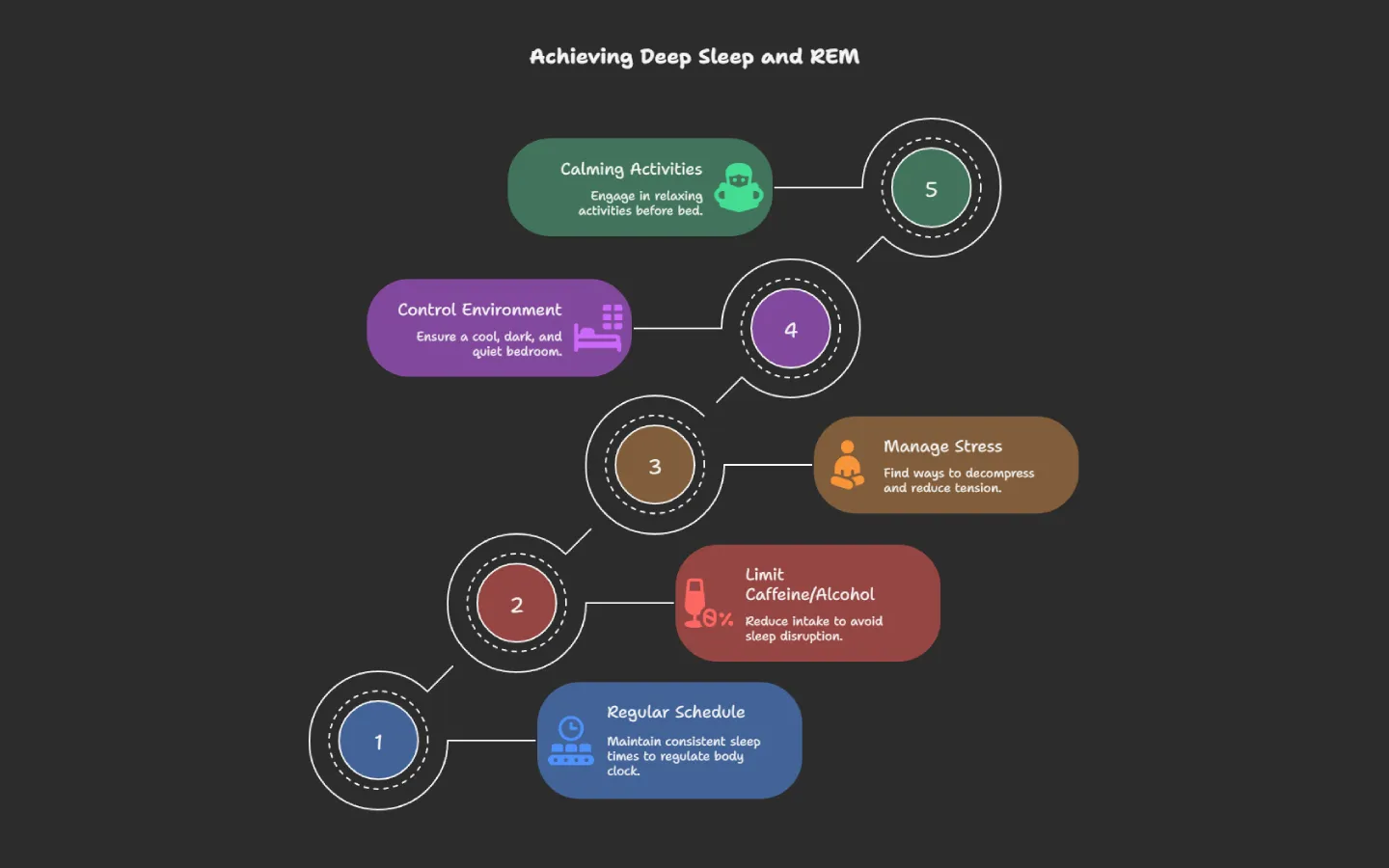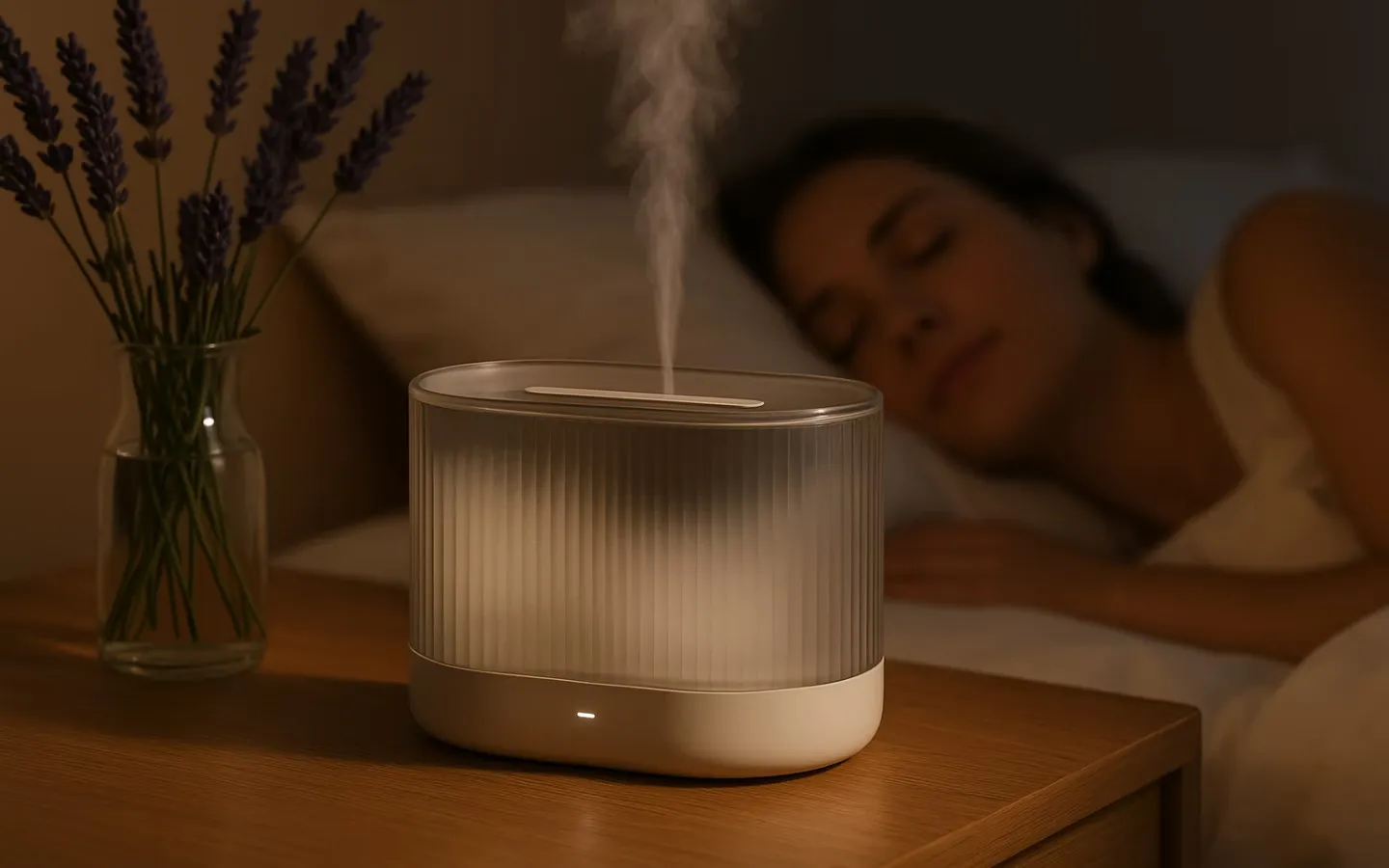August 16, 2025
Stages of Sleep Explained: Deep Sleep, REM, and Sleep Cycles
You can spend eight hours in bed and still wake up tired. The reason often comes down to how much time you spend in each stage of sleep. These stages are where your body repairs itself, restores energy, processes memories, and resets your mood.
When stress, poor habits, or environmental disruptions keep pulling you out of deep sleep or REM too soon, your recovery suffers. You may notice lower focus, more irritability, and less resilience, even if you think you slept enough.
The good news is that by understanding the stages of sleep and what affects them, you can make changes that protect your cycles and improve how you feel each morning.
What Are Stages of Sleep Cycle?
Sleep is not one long, unchanging state. It moves through four stages in a repeating cycle, grouped into two types: non-REM sleep (N1, N2, and N3) and REM sleep. Normal adults complete 4 to 6 of these cycles per night, with each cycle lasting about 90 to 110 minutes on average.
Stage 1 (N1) or Light Sleep Onset
Duration: 1–7 minutes
N1 is the first stage of sleep and is the transition from wakefulness to sleep. In this stage, muscles relax, breathing slows down, and heart rate decreases. Once you are in this stage, you may notice your thoughts drifting or see quick, dream-like images.
The time it takes to get from being fully awake to entering N1 is called sleep latency, and it can vary widely from a few minutes to much longer depending on things like stress, caffeine, and sleep habits.
Because this stage is so light, noise or movement can easily wake you up. You might also experience something called a hypnic jerk, which is a sudden muscle twitch that can create the sensation of falling. These are harmless but can be startling.
Stage 2 (N2) or Light Sleep
Duration: 10–25 minutes in the first cycle, lengthening in later cycles
Share of total sleep: Around 50%
In N2 sleep stage, your body settles into a steady sleep rhythm. Breathing becomes even more regular, heart rate decreases further, and core temperature goes down by a few degrees.
During this stage, brain produces sleep spindles, which are short bursts of activity linked to memory consolidation, and K-complexes, which help us to stay asleep by filtering out non-important noises. This is why you might not wake up from a passing car outside but still wake if someone says your name.
You are less aware of your surroundings than in N1, but still easier to wake than in deep sleep.
Stage 3 (N3) or Deep Sleep
Duration: 20–40 minutes in the first cycle, shorter later in the night
Also called: Slow-wave sleep
N3 is the most physically restorative stage. Compared to previous sleep stages, breathing here is even slower, heart rate is at its lowest, and muscles are fully relaxed. Brain activity has moved into delta waves, which are linked to tissue repair, immune function, and recovery from physical strain.
This is the stage where the body releases human growth hormone (HGH), which repairs tissues, strengthens bones, and supports muscle health. Missing too much deep sleep can leave a person tired, achy, and less resilient the next day.

For simple tips on how to get more deep sleep, read our post on improving sleep hygiene.
What is REM Sleep?
Starts: About 90 minutes after falling asleep
Duration: 5–10 minutes in the first cycle, 20–60 minutes in later cycles
Share of total sleep: 20–25%
REM (Rapid Eye Movement) sleep is when most dreaming happens. Brain activity rises to levels similar to being awake, the eyes move quickly under closed lids (which is how this stage gets its name), and voluntary muscles are temporarily paralyzed to prevent you from acting out dreams.
Compared to earlier stages, REM is more mentally restorative. It plays a key role in memory consolidation, learning, emotional balance, and creative thinking. Waking up too early or having fragmented sleep can cut REM short, which may affect focus, mood, and problem-solving skills that day. Adequate REM also helps the brain manage and recover from stress.
If you’re interested, read what we have to say about sleep-stress cycle and why it is so hard to break.
Are Stages of Sleep Important For Health?
In a nutshell, all stages of sleep are necessary and help in keeping you healthy:
- N1 and N2 prepare your body and mind for deeper rest.
- N3 (deep sleep) restores you physically.
- REM sleep supports brain function and emotional stability.
If one stage is consistently shortened from stress, poor habits, or environmental disruptions, the overall quality of your sleep suffers.

How To Get More Deep Sleep and REM?
By now, you’re probably thinking, “How do I get more deep sleep and support my recovery?”
You can’t force yourself into deep sleep or REM on demand, but you can set up the right conditions for your body to move through each stage naturally. The idea is to make it easier for your system to reach those restorative phases and stay in them long enough to get the job done.
1. Keep a regular schedule
Going to bed and waking up at the same time every day helps your body maintain predictable sleep cycles. Even small changes in timing can throw your rhythm off, so try to keep your sleep window consistent, including on weekends.
2. Limit caffeine and alcohol
Both can reduce deep sleep and shorten REM. Caffeine stays active in your system for hours, while alcohol may help you fall asleep but keeps you in lighter stages and causes more awakenings later.
3. Manage daily stress
Stress hormones can keep you in lighter stages and make it harder to reach deep sleep or REM. Find ways to decompress during the day so you’re not carrying that tension into bed.
4. Control your environment
Keep your bedroom cool, dark, and quiet. Temperature, light, and noise all affect how easily you can move through the stages without interruption.
5. Wind down with calming activities
Your nervous system needs a signal that the day is ending. Light stretching, reading, or using calming scents can help you slow down and make the transition to sleep smoother.
But why stop at just smelling?
With Kimba personal limbic therapy, scent becomes active support for your sleep.
[CTA_INSERT]
The Limbic System and Stages of Sleep Connection
The limbic system is the part of your brain that processes emotions, stress, and threat responses. It is closely linked to your nervous system, and it plays a big role in how easily you reach and stay in restorative sleep stages like N3 (deep sleep) and REM.
When your brain detects stress, whether it is from a sudden noise, physical discomfort, or racing thoughts, it can pull you out of these stages into lighter sleep. This is a natural safety mechanism, but when it happens often, your recovery suffers. You may wake feeling tired, unfocused, or emotionally flat.
How Kimba Helps You Get More Restorative Sleep
Kimba’s personal limbic therapy is designed to keep your nervous system in the calm state needed for deep sleep and REM. It connects to your wearable to monitor real-time changes in heart rate, stress levels, and sleep stages.
When Kimba senses you are starting to drift toward lighter sleep or waking, it releases a short, precisely timed burst of scent, formulated to signal safety and relaxation directly to your limbic system. This helps prevent unnecessary awakenings and supports a smoother return to restorative stages if you do wake up.
Because Kimba activates only when your body needs it, every release has maximum effect without causing scent fatigue. Over time, this means more complete sleep cycles, more deep sleep for physical repair, and more REM for emotional balance and mental clarity.
Join the Kimba waitlist to be the first to know when it becomes available!

Stages of Sleep Cycle FAQ
1. How long is a sleep cycle?
About 90 to 110 minutes for most adults.
2. Which stage of sleep is most important?
All stages serve different purposes. Deep sleep (N3) restores your body, while REM sleep supports your mind. It is the balance that matters.
3. What happens if I wake up during deep sleep?
Waking during deep sleep can cause sleep inertia, a groggy, disoriented state that may last several minutes.
4. How much deep sleep should I get per night?
Ideally, 1 to 2 hours distributed across the night. Early cycles will include the most.
5. How much REM sleep is normal?
About 20 to 25 percent of your total sleep. It increases with each cycle and can reach up to an hour in later cycles.
6. Does alcohol affect deep sleep?
Yes. Alcohol may help you fall asleep faster, but it reduces deep sleep and disrupts REM, which hurts overall sleep quality.
7. Can naps affect my sleep cycle?
Short naps (under 30 minutes) usually do not interfere with your main sleep cycles. Longer naps may reduce deep sleep at night, depending on timing.
8. Why do I feel more refreshed on weekends despite sleeping less?
Your timing and alignment with your natural circadian rhythm can make a shorter sleep feel more restorative than a longer but poorly timed one.
9. Is REM sleep more important than deep sleep?
Neither stage is more important. Deep sleep rebuilds your body, REM rebuilds your mind. You need both.


Continue reading

How High Training Load Can Disrupt Sleep Quality

The Link Between Poor Sleep and Muscle Recovery


